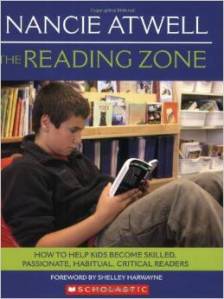Nancie Atwell was mentioned in several books on reading in the English classroom. She has done a lot of writing on reading workshops and how to get our students reading and falling in love with reading. My wife happened to have this book from her teacher preparation program days and a gladly lent it to me. I’ve really wanted to get my students to fall in love with reading again. It seems like there’s a sad break in reading in our national educational system. In elementary, they get specific time dedicated to reading and reading instruction. But once they get to high school most of that reading time disappears and is merged with langauge arts and curriculum instruction. It’s really up to high school teachers to carve out time to read in class. But one thing that is really lacking in high school is how to motivate students to read books that they choose and enjoy, not just the teachers’ choices. Usually, once students get to college, they have free time to read for enjoyment. But sadly, many who were good readers in Jr. high have lost their joy of reading after going through grueling high school programs.
This is what I’ve been trying to work on over the last several years. I want to bridge the gap between preparing my students for college while still fostering a love for reading. Studies have shown over and over that good readers make good writers. And good readers and writers do better on state and national tests. Which makes me wonder, do any of the assignments we gi ve students, like the book reports, projects, speeches, etc. actually do any good?
ve students, like the book reports, projects, speeches, etc. actually do any good?
This is what Atwell addresses in The Reading Zone. She sets out her program in her 7th and 8th grade classes for how she fosters reading. There was a lot of good information, but as a high school teacher, I don’t have the same time or curriculum that she does. But thankfully, she included a chapter for high school teachers.
It was tough hearing what she had to say. Tough because I know that we fail our high school students by killing a joy of reading. Instead of letting students read in class or outside of class we fill their lives with so much meaningless homework. It’s sick but sometimes, high school teachers seem to pride themselves on how much homework they have to grade. As if more homework was actually an indicator of a good teacher.
Having already begun my journey to make reading enjoyable, create authenticate homework and projects, and now with Atwell’s suggestions, I think that I can actually craft a quality English curriculum that can continue to foster a love of reading and writing while still preparing them for the rigors of college. Let’s just hope my colleagues and administrators don’t think I’m a slacker because I can actually enjoy my weekends!